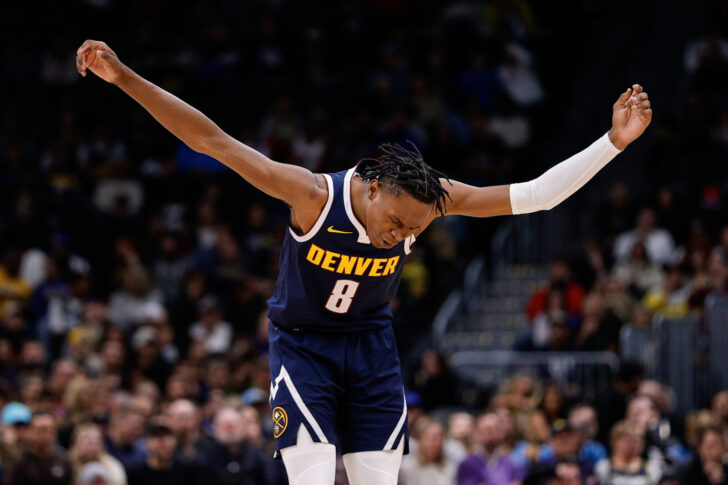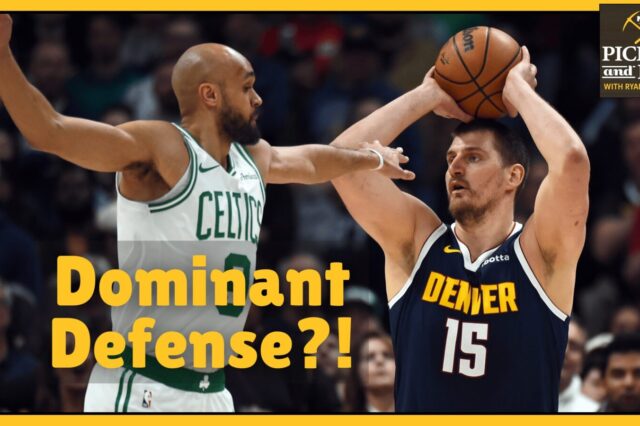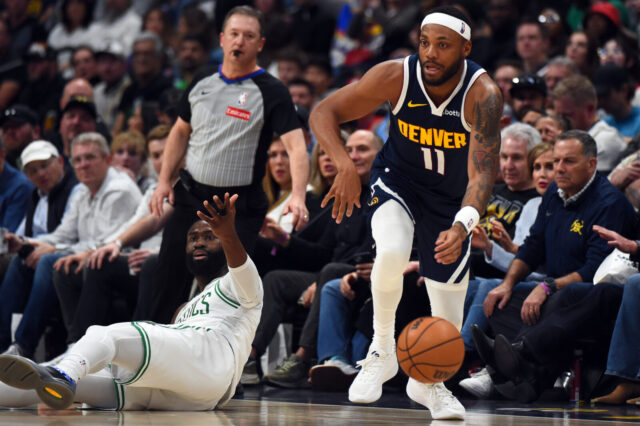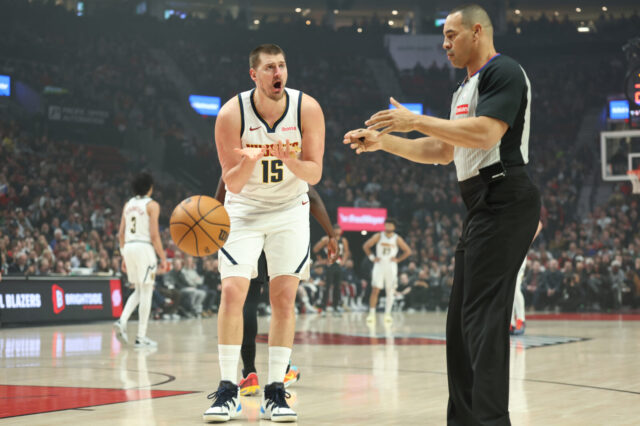Maybe Denver Nuggets general manager Calvin Booth is a wizard.
Perhaps Booth has the very best connections possible and makes use of them like none other.
Or maybe Booth just has the best eye for talent in Denver sports history.
Nuggets forward Peyton Watson just wrapped up the best four-game stretch of his young career with an impressive performance against the Toronto Raptors. There were a litany of defensive plays, offensive flashes, and transition sequences that caught the eye, just like they had in each of the previous three games too. In particular, Watson’s steal and left-handed dunk in the first half left me speechless at my computer, watching a 21-year-old discover in real time just how impactful the tools he has can be on the basketball court. Watson switched onto a post player, dug out a steal, attacked in transition, and forced fellow young forward Scottie Barnes into a serious business decision.
Of course, it wasn’t just the plays that featured the physical tools. Watson is seeing the court a bit better, finding ways to impact the game with more than just his defense and athleticism. In the same quarter, Watson attacked a closeout, stopped his dribble, and turned over the opposite shoulder to hit a jumper reminiscent of some of the elite wings Watson grew up watching.
If that wasn’t enough, it was nice to see Watson really seeing the floor over the last week. He finished last Saturday’s game against the Brooklyn Nets with five assists, one of the aspects of his game initially discussed in his draft profile but not often seen at the NBA level so far. Watson found his spots to create for others in this last week, and he just looks a bit more comfortable surveying the floor and making the right decision.
What one might say of Watson is that he’s adding some functionality to his dynamic talents. One of the most difficult leaps for any “raw” prospect to make (and Watson was clearly raw, he averaged three points per game in college) is to transition from potential to production. Most fans will look for the best in any prospect, block out what’s happening the rest of the time, and expect a coach to play a prospect through enough mistakes to iron out deficiencies. For some coaches and teams, that’s easier than others. For the Nuggets, Michael Malone has basically had no choice but to allow Watson the opportunity to figure things out. The departures of Jeff Green and Bruce Brown, the additions of three rookies to full-time roster spots, and an unfortunate offseason injury for forward Vlatko Čančar have opened the playing time floodgates for Watson more than any other player on the roster.
Early in the season, Watson showed those same flashes, and he had a very impressive performance against the Oklahoma City Thunder in the third game of the season with 17 points on 8-of-11 shooting and two “stocks” (steals + blocks). Since that game though, Watson had just one double-digit scoring performance up until these last four games and hadn’t made a single three-pointer. That’s not the kind of consistency the Nuggets were hoping to see and shows why contenders rarely rely on prospects for rotation minutes.
The last four games really emphasized what Watson is capable of. In those four games, Watson has totaled 82 minutes, 52 points, 22 rebounds, nine assists, three steals, and three blocks. Averaged out across four games, and those numbers don’t seem so impressive, but they’re actually less common than one might think especially when accounting for Watson’s age, position, and his efficiency.
According to Stathead’s “Span Finder” there have only been three players since 2000 to match or exceed Watson’s above production in a bench role similar to Watson’s (no starts) while under the age of 22: Domantas Sabonis, Jusuf Nurkic, and Andrei Kirilenko. That is certainly a curious assortment of players, but it’s good to be on a list with players that figured out how to be impactful. Names that have been compared to Peyton Watson in the last calendar year have been Mikal Bridges, Herb Jones, Jaden McDaniels, and OG Anunoby, modern wings/forwards with a defensive focus that every playoff team wants and values.
Comparable players, age 21* season
*Herb Jones’ rookie season https://t.co/VWwLP6oMTV pic.twitter.com/lbIFI41ndy— Adam Mares (@Adam_Mares) December 21, 2023
Of course, all of those names are fun house versions of Kirilenko, a three-time All-Defensive team member in the 2000s who was the Blocks leader for the entire 2005-06 season. The 6’9″ Russian played both small forward and power forward for the Utah Jazz, operating as the ultimate connector.
It’s unfair, perhaps, to compare Watson to Kirilenko. Watson is still trying to figure out where he fits within the NBA, while Kirlienko walked into the NBA as an impactful jack-of-all-trades forward with the skill set to match. Still, if there’s a player I think Watson could emulate in his quest to become the most valuable player he can be, there are far worse options than the borderline Hall-of-Famer in Utah.
Kirilenko may not be the perfect match for Watson from a physical profile perspective, as the Russian forward was 6’9″ with a 7’4″ wingspan. Watson stands at 6’8″ with a 7’0.5″ wingspan and is clearly a bit smaller, but it terms of the role, there’s no player I’d rather Watson emulate than Kirilenko as he grows older. Kirilenko never became an elite outside shooter, but he kept defenses honest with his jump shot. That afforded him the opportunity to maximize the rest of his game: creating off the dribble, reading the floor, playmaking for others, guarding 1-on-1, and offering some of the best help side defense in NBA history from the forward spot. Kirilenko never made it to the Hall, but he was what some may describe as a super role player, clearly more valuable than a role player moniker but not quite possessing star level scoring traits.
Watson is currently 21 years old and won’t turn 22 until next September, and it’s important to remember how young and inexperienced he still is. He will put on some more muscle throughout his career and become stronger. Right now, he’s a bit undersized for the power forward position, especially when facing some of the stronger forwards like LeBron James and Giannis Antetokounmpo. It’s possible that Watson never gets strong enough to defend those guys, but as for every other perimeter player, there are few players better suited to guard up and down the position spectrum like Watson.
The Nuggets, as it stands right now, have their star duo in Nikola Jokic and Jamal Murray. They even have a third scorer at the moment that can provide elite floor spacing in Michael Porter Jr., so even in the long term vision for Denver, it’s difficult to foresee the Nuggets needing high level scoring. Could they need the role player skills, especially defensively, provided by players like Kentavious Caldwell-Pope and Aaron Gordon? Could Denver use that roaming rim protector at the back line of the defense especially if they continue to play Jokic at the level defensively in aggressive coverages?
I see Watson as a window into what Denver could look like years down the road. It may not be an immediate move, and the Nuggets will not rock the boat on their current formula until they feel the need to do so.
It’s something I’m keeping an eye on though, that’s for sure.



